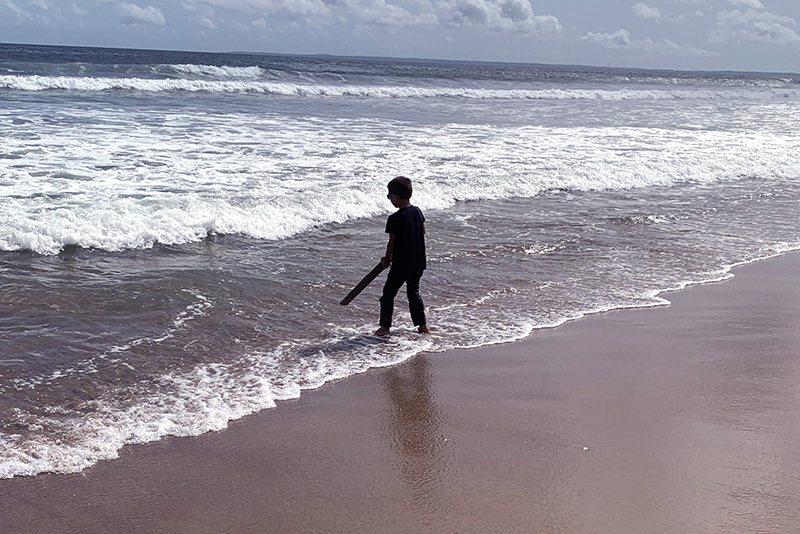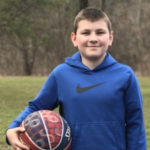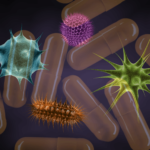Finding hope in hard times: Max’s journey with ulcerative colitis and primary sclerosing cholangitis

When Rachel’s son, Max, had a string of persistent symptoms that caused him to be in and out of their local pediatrician’s office, Rachel knew something deeper was going on. “He would wake up from a deep sleep with intense abdominal pain, fever, and vomiting, he was very sick.” Their pediatrician thought Max just had multiple viruses, but Rachel and her family were determined to get more answers.
Being from the Boston area, Rachel knew that Boston Children’s Division of Gastroenterology, Hepatology, and Nutrition was the best place to find those answers.
Feeling hopeful through hardships
Max was initially seen by Dr. Scott Snapper and his team at the Inflammatory Bowel Disease (IBD) Center. By then, his symptoms had escalated to include bloody stools along with periods of acute abdominal discomfort. Just over a week after their visit, and after additional labs and diagnostic testing were run, Dr. Snapper reached out to Rachel to inform her that Max had very early onset inflammatory bowel disease (VEO-IBD) in the form of ulcerative colitis and primary sclerosing cholangitis (PSC).
Ulcerative colitis is a type of IBD in which the inner lining of the large intestine (colon) and rectum become inflamed. The inflammation usually begins in the rectum and lower large intestine and then spreads upward, potentially involving the entire colon.
PSC is a chronic liver disease, rare for adults and even more rare for children, where the bile ducts inside and outside the liver become inflamed and scarred and may eventually become blocked. When this happens, bile builds up in the liver and causes further damage.
“Hearing that PSC is an unpredictable, untreatable, and progressive disease was a very horrific experience as a parent,” remembers Rachel. “Thinking that there was nothing I could do to help my son left me feeling helpless, but never hopeless.” Dr. Scott Elisofon in the Division of Gastroenterology, Hepatology, and Nutrition has been treating Max’s PSC, for which Rachel says she’s very grateful.
Collaboration is key
Since the diagnosis, Dr. Snapper has worked with Max and Rachel to put together a personalized care plan that evolves and grows as new research developments are made in these conditions.
Rachel shared how “critically important” this partnership is: “Both the hepatology and IBD teams have educated my family, answered all of the questions my husband and I have had throughout the entire process, and have kept Max in the loop of caring for his body.”
Rachel shares that the “worst thing” a parent can do is scroll on Google and read all the devastating things that may happen to your child. “Instead of spiraling down that hole, Dr. Snapper and his team have always been available to answer any questions, any time of day,” explains Rachel. “That type of interactive dialogue has served as a great comfort for me and my family.”

Answers on the horizon
While Max’s PSC and ulcerative colitis are life-long conditions, there is research underway that is being led by the IBD and Hepatology teams at Boston Children’s.
Rachel jumped at the opportunity to involve Max in research trials to help offer insight into what works for the future treatment of PSC and IBD. “Max wants to be a scientist when he grows up, and he’s now able to say he’s been part of research that focuses on patients like him. He knows that his participation in these trials will help researchers to find answers to help other kids grow up strong,” shares Rachel.
Even with these serious diagnoses, Max has kept a smile on his face and is living a fun and active life. At eight-years-old, he’s an avid hiker, a fan of swimming laps around the pool, and loves building Legos and playing soccer with his brothers.
“While current medical protocol is lacking on the rare disease of PSC, my son is doing better today than when we first arrived at Boston Children’s four years ago,” says Rachel. “I believe this is because of the partnership, communication, and respect between our physicians and us as parents.”
Learn more at Boston Children’s Hospital Inflammatory Bowel Disease Center
Related Posts :
-

IBD surgery gives Ben a new taste for life (and hamburgers)
Ben Irland, 13, has been enjoying a lot of hamburgers lately. It’s an exciting development for him, since until recently ...
-

Yoga program helps children and teens better manage IBD and stress
In a dimly lit room, about a half dozen teens stand quietly, each trying to balance on one leg. The ...
-

Identifying specific markers in blood may improve diagnosis of IBD in children
New research may lead to improved methods to diagnose inflammatory bowel disease (IBD) in children. This could be ...
-

Could fecal transplants heal Crohn’s and colitis in children? Two trials are set to find out
Could an exciting potential treatment for inflammatory bowel disease (IBD) be found in the gastrointestinal tract itself? That’s the ...





